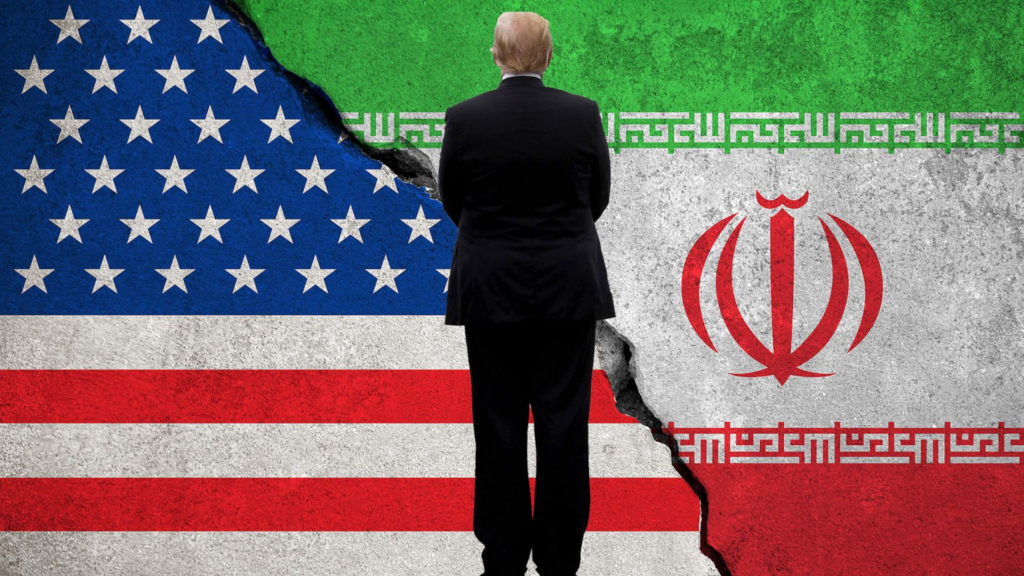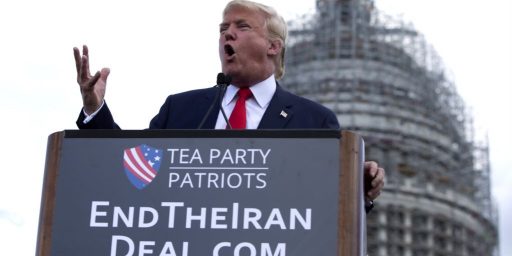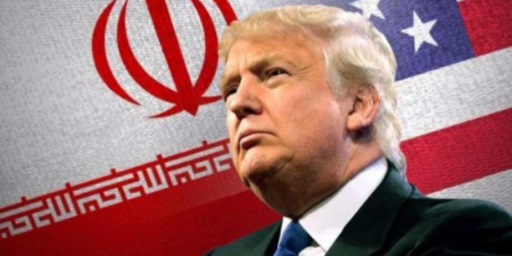Trump’s Iran Policy Isn’t Working Because It Isn’t Supposed To Work
The Trump Administration's policies toward Iran aren't going to work, but that's because they aren't supposed to work.

Jennifer Rubin at The Washington Post is trying to figure out exactly how the Administration’s Iran policy, which began some two years ago with the decision to repudiate and eventually withdraw from the Joint Comprehensive Plan of Action (JCPOA) is supposed to work given the manner in which they are trying to implement it:
The Trump administration’s post-JCPOA (Joint Comprehensive Plan of Action) strategy is to put Iran’s economy in a stranglehold, by among other things, ending waivers for allies that purchase Iranian oil. There are a few serious problems with this strategy.
First, it’s not clear that five powers (China, Japan, India, South Korea and Turkey) that are the intended targets of the pressure campaign will all comply. “The Iranian economy is already reeling from sanctions that have also led to a shortage in critical medicine, and Iranian-backed militias have been forced to tighten their payrolls,” the New York Times reported. “By retracting its oil exemptions, the Trump administration is encroaching on China’s energy security even as Washington is trying to strike an all-important trade deal with Beijing. The United States also needs China’s help in controlling North Korea’s nuclear weapons development.”
(…)
Moreover, if sanctions pressure does increase, it’s not at all clear that Iran is going to return to the bargaining table to redo the deal, and even less clear that it will give President Trump a better deal than it got with President Barack Obama. Iran, after all, has been muddling along under the cloud of sanctions on and off for decades. Having divided the United States from its negotiating partners (or rather watched as Trump divided the alliance) and seen Trump abandon anti-Assad allies in Syria, it reasonably or not sees less reason to capitulate.
Rubin points to a piece at NPR.com by Aaron David Miller and Richard Solkosky, who argue that Trump’s policy, which basically consists of applying economic pressure in the hope that this will either bring the Iranians back to the negotiating table or bring about an economic collapse that will lead to regime change can’t work:
The administration based its decision to cancel sanctions waivers on several assumptions: First, that Saudi Arabia and the United Arab Emirates would increase oil production to keep oil prices from escalating. Second, Iran’s major oil customers — including China, India and Turkey — would reduce their oil imports from Iran to zero under the threat of additional U.S. sanctions. Third, Iran has limited options to drive up oil prices to maximize revenues from its residual oil exports.
The realities are not likely to play out as the U.S. assumes. Saudi Arabia and the UAE are unlikely to sustain higher production levels for very long, out of concern for stability in oil markets. Iran’s “heavy oil,” which many countries need for refined oil products, cannot be replaced by Saudi light crude. Turkey, China, India and possibly some European allies will find ways to work around U.S. sanctions for both economic and geopolitical reasons. And Iran can reduce oil supplies leaving the Persian Gulf. It has threatened to close the Strait of Hormuz, and could conduct cyber operations against oil infrastructure on the other side of the Gulf.
The U.S. waivers announcement came on the heels of the administration’s decision to designate Iran’s Islamic Revolutionary Guard Corps as a foreign terrorist organization. Neither of these U.S. decisions will fundamentally alter Iran’s regional behavior.
The Iranian regime sees its support for Shia allies in Iraq, Syria, Lebanon and particularly Yemen as a vital national interest — a hedge against Sunni dominance and a counter to America’s influence. It has already cut back somewhat on its funding for these regional priorities, and may be forced to curtail them even more. But Iran is prepared to endure great sacrifices to defend them. And its regional allies and proxies have their own motivations and means to align with Tehran and support its behavior.
Secretary of State Pompeo insists that the U.S. “maximum pressure campaign” is designed to bring Iran back to the negotiating table. That hardly seems credible. Both Pompeo and National Security Adviser John Bolton are longtime champions of regime change.
The 12 demands Pompeo issued last year to Tehran were, for all practical purposes, a demand for Iran’s surrender on the nuclear deal, its regional behavior, its testing of ballistic missiles and other Iranian practices the U.S. doesn’t like.
Iran is in no hurry to negotiate, preferring to wait Trump out in hopes he will be a one-term president and the next administration will return to the nuclear deal.
Regime change imposed from the outside is an illusion. Consider, for example, U.S. efforts to get rid of the Nicolás Maduro regime in Venezuela. The U.S. has scores of nations committed to the goal, geographical proximity, a legitimate opposition on the ground and a virtual stranglehold on the Venezuelan economy. Yet the U.S. and its allies aren’t succeeding.
In contrast, the Iranian regime remains legitimate in the eyes of millions of Iranians, has been in place for four decades, retains tremendous repressive power, enjoys the support of Russia and China and faces no organized opposition on the ground. It is fantastical thinking to believe that Washington could get rid of the regime. If internal changes come, they will be driven primarily by Iranians themselves. In fact, Trump is likely to leave before the mullahs do.
The Trump administration can cause Iran severe pain, but it cannot trigger massive internal unrest that that will precipitate the collapse of the regime or a fundamental change in Iran’s regional behavior.
Daniel Larison, commenting on the Miller/Sokolosky post, makes much the same point:
Iran is one of the largest countries in the region, and it is one of the relatively most stable. Whatever other disagreements the U.S. and Iran may have, the U.S. and the region are both better off with an Iran that remains stable and at peace. Nothing good would come from turning Iran into a much larger Syria, and whatever emerged from the chaos of regime collapse is unlikely to be less authoritarian and illiberal than the current regime. The only reason to seek the collapse of Iran’s government is if you want to subject tens of millions more people to chaos, upheaval, and war for years to come. Certainly no one interested in the welfare of the Iranian people would seek to force such an outcome. Strangling the country economically in the hopes of triggering an uprising against the government is immoral and won’t work, but it is nonetheless insane to try to destabilize a country of eighty million people for the benefit of a handful of reckless regional clients. It is true that Trump’s Iran policy is failing, but we should all earnestly hope that it never comes close to succeeding.
I generally agree with both Miller and Solkosky and Larison regarding the odds that the Trump Administration’s policy of applying increasing economic pressure to the Islamic Republic in the hopes of strangling its economy isn’t likely to work.
For one thing, it’s becoming increasingly clear that the Administration is not getting much cooperation from the rest of the world. China and Russia are certainly not interested in reimposing the sanctions that they lifted when the JCPOA deal was reached. Instead, they’ve been moving ahead with military and other deals with Iran and there’s not really anything we can do to stop them. Similarly, our European allies that were part of the JCPOA, the United Kingdom, France, and Germany, have taken a stand against the American withdrawal from the agreement and continue to point out that, contrary to the Trump Administration’s claims, Iran is complying with the terms of the agreement and its obligations regarding its nuclear research programs.
Third, the idea that economic pressure is going to bring down the Iranian regime is a foolish idea at best. The Iranian government and people have been dealing with the consequences of international sanctions virtually from the time that the regime was born, and most certainly from the beginning of the Iranian Hostage Crisis in November 1979. While the JCPOA did lift the sanctions aimed at bringing it to the table on the nuclear weapons issue, there are many other sanctions related to its ballistic missile program and other policies that remain in place. Despite that, and despite the economic hardship it has caused, the Iranian regime has survived for nearly 40 years now, seems to generally have the support of the man and woman in the street. and shows no signs of going anywhere. If the Administration’s efforts in Iran are having any impact at all, it appears that they are helping to reinforce the position of the more radical elements of the regime who have been against the JCPOA from the beginning. The idea that this ultimately doomed attempt to reimpose the sanctions lifted by the JCPOA will change that is naive at best.
Finally, there is little evidence that other oil-producing nations are willing or able to make up for the loss of Iranian oil on the world’s markets, meaning that the net result of the sanctions will be an increase in the price of oil and gas worldwide. To be frank about it, all of this should have been self-evident long before the Trump Administration took the first steps down this policy road with the repudiation of the JCPOA.
Instead of accepting the idea that the Trump Administration is proceeding down a road that it won’t succeed based on either ignorance or foolishness, though, let me offer an alternative hypothesis. Namely, that the U.S. policy toward Iran isn’t working because it ultimately isn’t supposed to work. Many of the President’s top advisers, including National Security Adviser John Bolton and Secretary of State Mike Pompeo, have made no secret of the fact that they believe that the only solution to the problem of the Iranian nuclear program and the very existence of the Islamic Republic is military action. This is an argument that has also been made repeatedly by Israeli Prime Minister Benjamin Netanyahu and supporters of Israel in the United States who have long argued in favor of immediate military action against the Islamic Republic despite the fact that there is little evidence that such action would either have any impact on Iran’s military research programs or on the sustainability of the regime. This doesn’t necessarily mean that the Administration is consciously pursuing these policies with the idea of setting up an argument for war. but it does mean that because of the bias in favor of the eventual need for military action that exists in the Administration and the GOP generally the fact that the current policy is doomed to fail is a feature, not a bug.





There is no policy. There’s an unhinged, senile old crank yelling, We gotta do something to hurt Iran. Why? I have to show the base I’m tough, I hate Angela Merkel, and MBS will loan me a few billion when I need it.
With this directive in hand his incompetent and malicious minions try to cobble together a rationale. Not a policy, just an ex post facto pasting together of various tweets and random blurts at rallies and whatever idiocy their boss said to Hannity the night before. They won’t fail because they are intentionally failing, they’ll fail because Trump has literally no idea how to define what success might be. They aren’t going anywhere, they’re just doing donuts in an empty parking lot.
What’s so amazing is that all the people who celebrate Trump for abandoning the failed policies of previous administrations on North Korea are celebrating Trump’s tough stand on Iran, which at the end of the day is pretty much all of those previous administration’s policies on North Korea turned up to 11.
But of course, those people are also convinced that Trump’s North Korea policies* are about to lead to Kim giving up his weapons at any moment, so their Foreign Policy judgement might not be the best.
* – For the record, I’m not suggesting that previous Administrations took the right approach to the North Koreans either.
Winner, winner. And in addition to Netanyahu, I’d also add the Saudis to the list of people who also share this view.
BTW, remember when Trump supporters listed Clinton’s close ties to the Saudis as a reason to vote against her…
@Michael Reynolds: Oh, I think it’s worse than that. The Israelis want Iran removed as a threat. The Saudis want the Shiites suppressed. Neither wants to spend the blood and treasure to do it themselves. They think they can manipulate and bribe Trump into doing it for them. They think that with Obama gone we’re back to the good old days when Prince Bandar could play the Bushes. I think they’re right. However, this is going to be a hard sell. If Trump starts a war with Iran to boost his reelection, he may find he miscalculated.
I don’t think Trump is actively looking for a war. It’s not something he campaigned on, or seems very interested in. I think in Iran he wants to 1) undo an Obama treaty that was unpopular with his base (and that’s not exactly working well, is it?), and 2) make any deal, even one awarding Iran $10 trillion per year for limiting their nuke production to 5 weapons per year, and claim he made a the BESTEST DEAL EVER!!
The problems are: 1) such actions can lead to war anyway, one El Cheeto and what passes for his administration would not be prepared to fight, and 2) very likely Bolton and co. do want a war, seeing as how well the US has done with regime change in the region, right?
We had 120,000 soldiers in Iraq in 2003 which was inadequate and had to be bumped up in the surge. It will take at least that number to fight a war in Iran. In Iraq, we had support from the UK, Australia, and Poland. I am fairly sure that the UK won’t send any soldiers to fight in Iran this time. Turkey and Russia will be quite unhelpful. Israel was unable to remove Hezbollah from Lebanon; don’t count on them to be a big force. No one with any claims to sanity thinks that we can field 200,000 soldiers, spend another 2-3 trillion dollars (at least), and accept 5,000 KIA. There aint going to be any war against Iran. It just won’t happen. Forget it!
I agree with the posting that there does not appear to be any rationale for our stance vis-a-vis Iran that makes any sense.
@gVOR08:
Israel and Saudi Arabia definitely have policies – Netanyahu’s a thug and MBS is a piece of shit, but neither is as short-sighted, ignorant and stupid as Trump. Trump is not capable of caring about anything but money and his own ego. Everything he says or does is about money and ego.
I think Israel and the KSA will continue to try and edge us into war – moving the embassy, absorbing the Golan, sending more weaponry to KSA to murder Shiites in Yemen. It will be interesting to see what happens if there’s an incident between a US destroyer and an Iranian patrol boat. I won’t be at all surprised to see the KSA try to engineer a Tonkin Gulf incident.
I don’t think Trump wants a war – war won’t make him richer or more popular. But he’s a weak, impetuous (and again, stupid) man so he might easily be bullied into it.
Should Trump deciding to drive up oil prices the year before the election be treated as an in-kind donation to the DNC?
@Slugger:
Tiny is ignorant of history and regardless, Iraq was a fiasco because it was run by a Bush and he’s the great leader who’s smarter than all his generals. Bolton, Pompeo and the Iran hawks can manipulate him into a war. Congress won’t be a savior as it extremely doubtful that Tiny would seek a declaration of war and once there are US troops on the ground the equation changes as we need to “support the troops.”
Iran attempts to cut off the Strait of Hormuz, Iran’s mosquito navy miscalculates or a US warship hits a mine and all bets are off. To @Kathy: point on unintended consequences.
@Michael Reynolds:
My current great fear is he’ll ask “how much would it cost to nuke Iran?”
We all know the cost to be astronomical, but monetarily it is rather small. Any doubt what part would Dennison focus on?
I wonder what a Persian Gulf war would do to the oil futures market.
@Kathy: “My current great fear is he’ll ask “how much would it cost to nuke Iran?””
It’s far more likely to be “how much will you pay me if I nuke Iran?”